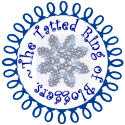While I stand by the things I said before, I wish I had said more, or moderated my tone. In my mind there is a difference between those copytatters who knowingly mean to do ill, and those who do it unknowingly, and they should be treated differently. People with the good intention of protecting copyrights can come down too hard on the latter group.
I have been told that other crafting communities perceive tatters as an insular bunch, hostile to newcomers, and overly obsessed with copyright issues. We bring this on ourselves when we over react. My inbox tonight included a message from someone who was giving up on tatting after being made fearful of condemnation from an accidental misstep. Tatters are also a very caring, generous group, but we sometimes scare people off before they see that side of us.
There are those who knowingly, willfully copytat to take advantage of others' hard work without paying for it, and I have no tolerance for this. On the other hand, those who act out of ignorance like I did in my younger days can be redirected onto a better path without the need for frightening them or hurting their feelings.
As a community, we need to uphold our standards of behavior by informing people as to what constitutes a problem and why, not threatening them for crossing a line they did not know existed. Imagine the fledgling tatter proudly showing off a new accomplishment, and being pounced on by half a dozen people saying she could be liable to legal action. Too much of this goes on, especially on Facebook. Someone who has done a little copytatting without realizing it is a problem needs to be enlightened, not threatened. If they have learned enough to be able to copy, they are on their way to becoming a proficient tatter, someone whose energies can be redirected into becoming a valued member of our community. If they acted in ignorance or misunderstanding, but meant no harm, we can work with them instead of attacking them.
For the future strength of our craft, we need to be careful not to frighten people out of trying to develop their creativity. It is OK for them to be inspired by something they have seen if they aren't trying to mimic it too closely, so don't tell them they can be sued for making something that resembles anything else. Many basic designs have been re-invented again and again independently, so don't jump to a conclusion of plagiarism. If you think someone's copyright has been violated by copytatting, it is best to notify the injured party and let them deal with it. Failing that, state your concern tactfully, and listen to their response. Try to discuss without attacking. You can always toughen your response to a true offender if you find it justified. It is harder to get someone to come back into the fold if they have fled after being rained down upon with condemnations. Chastise the real wrong doers, but don't scare off potential new friends.













.jpg)


































